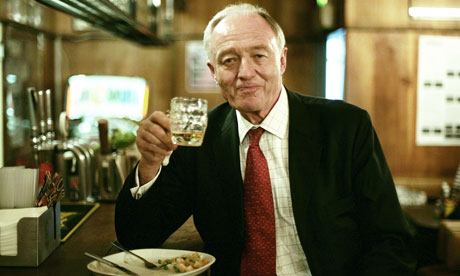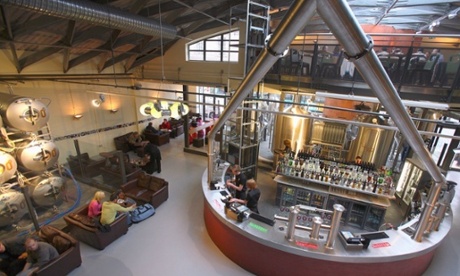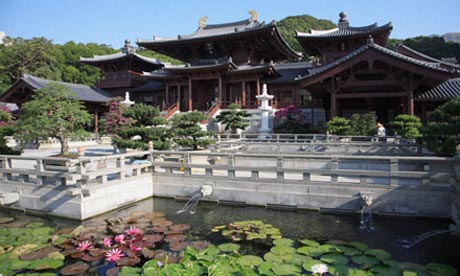Winter 1946. Bombs have laid waste to huge swaths of north London. The rebuild has yet to begin in earnest. Many residential properties are still in a state of shock, fractured windowpanes patched up with cardboard to stop the icy wind of a particularly harsh winter whistling in. Canonbury Square resident, former BBC reporter and writer George Orwell sits down in a freezing flat to type a column for the London Evening Standard. Although keen to return to the isolation of Jura to properly commit to his follow-up to the recently published Animal Farm, Orwell decides to compose a paean to a subject close to his heart: the British pub.
Published as the Saturday Essay on the 9 February edition of the paper, Orwell's piece – The Moon Under Water – promised "the secrets of his favourite public house". Although the Moon is a work of fiction, it stands as the blueprint to pub perfection. It is two minutes from the nearest bus stop but the drunks and rowdies never seemed to find it. It is home only to regulars and locals and the barmaid calls you "dear" irrespective of sex or age. It serves solid, reliable food and the beer always arrives in the right kind of vessel. It is salvation – refuge from the rubble and the rationing.
Perfection then, but what about now? After decades of reconstruction, the capital would be barely recognisable to Orwell; its pubs even less so. These days, the British pub is utterly beset by excessive taxation, by the smoking ban and supermarket pricing. No high-street boozer is complete without a flickering telescreen behind the bar, broadcasting a constant dribble of Sky Sports, Sky News and pointless FTSE figures. If the barmaid was to call you dear, you'd be hard pushed to hear it over the raging MP3 jukebox. More often than not they are, as Orwell put it, "mere boozing shops".
Trying to work out what the pub means in the 21st century, by following in Orwell's footsteps may seem like a futile project.
Orwell hit a deep resonance, even when writing about the humble pub. The principles he mapped out on the page are universal, timeless even. In describing what so many of us seek in a perfect pub – solace, authenticity and a very real kind of community – he wrote a manifesto that lives down the ages. In the Moon Under Water, everyone was equal in front of the bar, regardless of age or sex – it was egalitarian by design. A place of serenity. A haven for thought and conversation.
These foundation ideas have seemingly been lost in so many once-proud boozers. It's a major factor in the thoroughly depressing statistic that - according to the British Beer and Pub Association – 25 pubs close each week. As the beer writer Pete Brown explains: "I was researching for a piece about community pubs and I heard the same story everywhere I went. In each place, people were saying that the decline is invariably down to publicans who don't understand the business or – more often than not – publicans who just don't understand people."
However, there are glorious sparks of independence out there. Micro-pubs such as Herne's Butcher's Arms, tucked down a back street in a former shop, where there's never any music so as to encourage conversation. Floods of young, innovative startup breweries such as south London's The Kernel or Huddersfield's Magic Rock or Fraserburgh's Brewdog, each promoting local distinctiveness through beer. Cooperatives clubbing together to save pubs – such as the Old Crown in Hesket – rather than see their villages go dry. Each of these setups – pubs and the breweries that serve them – is fiercely independent and utterly committed to serving their community first.
As long as they serve (or brew) a decent pint of draught stout, I'm pretty sure Orwell would raise his china mug to them.
Ken Livingstone, the Queensbury, north London
I hadn't picked up on pub closures because the pub that I use most often, the Queensbury in north London, is absolutely thriving. It's near home and near the train station, it has a nice garden and it does nice food, but above that, the significance for me is that it used to be the offices of the Brent Conservative Club. Each drink I consume in there is viewed as a triumph over vanquished opponents.
Conversations with the GMB Union alerted me to the sheer number of pubs that had closed in recent years. I became mayor; two years afterwards I became a dad again. Suddenly any social life went out the window, I almost never went out, I just couldn't. Subsequently, I missed so many of the pub losses that were happening in the capital. Saving pubs is now a policy in my 2012 mayoral campaign.
In the 1960s, if you wanted to drink you went to the pub. People didn't used to have booze in the house back then and there seemed to be a pub on every block. Nowadays, we're at a point where economic circumstances are pushing in all the wrong directions. The worry is that as pubs close, corporations that own them will sell to developers to convert into very expensive, fashionable houses. Not only will you never get the pub back, you'll lose the uniqueness of the building and subsequently the character of the area.
What I'd really like to see in an ideal world is lots of locally owned community pubs rather than chains. I think local authorities should have the power to determine the composition of their high streets. If you buy a bakers or a fishmongers or a former pub, for the good of the area it should be sold with that usage attached. Unless, that is, it used to be the local Conservative Club.
Carl Barat, The French House, Soho, London
The French House is one of those places where you actually feel like you're alive. It's always full of characters. It's a throwback to the days when the great and the good would mix in the pub, shoulder to shoulder with everyone else. You can imagine Alec Guinness walking in at any minute, or Pinkie from Brighton Rock. It still feels like Soho in the 50s. It's a miracle it's still there, especially when the area has lost both the Astoria and the Colony in recent years.
t's got a fascinating history, too. It was opened by a German called Schmidt in 1910 who was deported at the start of the first world war. A Belgian chap called Victor Berelemont ran it and changed the name to the York Minster. His son, Gaston, who was born in the pub, then ran it until 1989. They changed the name to the French House because it's most famous as the home of the Free French during the second world war. De Gaulle was supposed to have written his rallying call to the nation, "A tous les Français", in there. It's still got a continental feel. I love the fact you can only order halves; it's a bit of an in-joke for the regulars.
It's a pub for people who understand the culture that goes with drinking. Alain de Botton recently said: "Why is it that gazing out of the window is now classed as doing nothing? That sums up the appeal of the French for me. It's the perfect place to while away an afternoon.
James Dean Bradfield, Vulcan hotel, Cardiff
I've had a really long relationship with the Vulcan. Weirdly, I used to get taken there as a kid on international days. I like the fact that it was a bit off the main drag. It's worth the effort you have to make to go there. The nearest pub to where you live or work isn't always the right one, in fact most of the time it's the complete opposite. It's appalling that the Vulcan is threatened with demolition. It's a perfect example of an old-fashioned Welsh pub, beautifully basic. These places have to be preserved for future generations, they're a reflection of the times they've survived though.
It's hard to see pubs as we know them existing for much longer because everything is so much geared towards reinvention, making things more healthy. From the food served to the smoking ban. Pubs now have become the acceptable face of intellectual gourmet-ism, part of an aspirational lifestyle sold in Sunday supplements. You haven't got the freedom to be decadent in the working-class sense anymore.
I think what gets lost so often is simplicity. Somewhere like the Vulcan, there isn't that much to do there. You either drink or you play darts or you talk and that's enough. I hate the fact that people come to places and say, "This place must change!" Why does everywhere have to hauled into the modern era in the name of progress? My heart always sinks slightly when I hear about somewhere that I've found solace in – a truly great pub – that has been taken over and been spruced up. So many of my favourite locals over the years are now thin approximations of what they were. And half the time, they're struggling to get customers in as they've lost the spirit of what made them great. Progress would change everything that I love about somewhere like the Vulcan, somewhere that seems to seep history through the very walls.
Guy Garvey,
The Briton's Protection, Castlefield, Manchester
I don't drink as a rule, but one proud little abode cowering in the shadow of the monstrosity that is the Beetham Tower is a lovely little old Manchester boozer. Because at the end of Bridgewater Street facing Bridgewater Hall, looking proudly incongruous and surrounded by red-brick new-builds, is a beautiful old pub called the Briton's Protection. You never know who you'll find in there. You're as likely to see the entire brass section of the Halle Orchestra running across the road at the interval for a swift pint as you are a room full of drunken retired policemen. Or a handful of conceptual artists arguing passionately about literally nothing, as you are the Gay Classic Cars Society, the Peterloo Massacre Memorial Trust, a handful of Coronation Street stars or some very drunk musicians. The one thing that everybody who uses the Briton's has in common is that they like a drink and they like a chunner.
It has been trading under its current name since 1806, it boasts 250 kinds of whisky, a very well-kept cellar and no jukebox (bliss). The staff are warm and friendly and not in a production-line way, in fact they've long been my mates. Gwen, who runs the place, is a sharp-witted, elegant and glamorous northern angel, the kind Dylan Thomas would find a whole book in. I haven't even touched on the original features and beautiful Victorian decor, the snug rooms with cosy fires or the well-heated and well-sheltered "smokers rule" beer garden. Every now and again there's talk of it being sold, and this scares me to death. We love the Briton's. Change nothing, lovely old pub. Go nowhere.
Liela Moss, Prince George, Dalston, London
In my earliest memories of the pub, I'm hassling my Dad to drink up – to no avail – and being given a quid to feed the jukebox to keep me quiet. Growing up, pubs were hugely formative. I'd entertain myself at the jukebox, selecting things I'd not heard before. I remember one moment, aged about eight, hearing For Your Love by the Yardbirds. After that, I started to gain a deeper understanding of music. I'd only ever really heard the Beatles and the Stones in the car and hadn't much experience of music from that era. The pub jukebox brought it all to life.
These days, I live above a pretty Victorian boozer. I've been there for several years and feel part of its little community. I love the low hum of conversation and music that vibrates up through the floorboards. It's very comforting. Being entitled to lock-ins and late "afters" used to feel like a special advantage. That novelty has severely worn off now!
For me, a great pub should offer a non-judgmental refuge, a haven for conversation, laughter and ideas. Pubs offer company and connection for lonesome types that need a bit of banter and cheer of an evening, while supporting those who'd rather be alone and read, write or people-watch.
My family own a few pubs. To quote my dad, whose ideas about pubs are massively influenced by the Orwell essay: "You've got to have hard wooden furniture like old church pews that are a bit uncomfortable. The English are essentially puritans. Fulfilling enjoyment can only be obtained with a certain amount of discomfort and sparseness." I like the idea that we're permitting ourselves a little drunkenness under sufferance!











